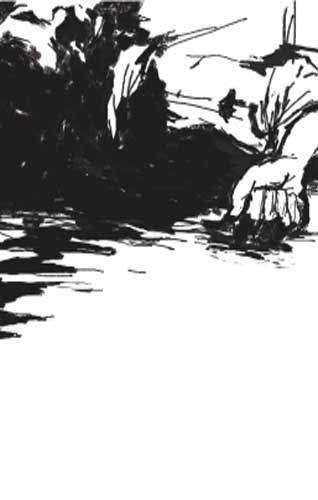1984
Searing Truth-Telling:
Jaspreet Singh's "Helium"
A Book Review by CYNTHIA KEPPLEY MAHMOOD
HELIUM, by Jaspreet Singh, Bloomsbury, 2013. 294 pp., US$25, ISBN 978-1-60819-956-3
In the rarified air of Simla, an Indo-American professor of rheology and the woman he once loved pursue, tango-like, their memories of the anti-Sikh pogroms of 1984.
The professor was at one time a student at the Indian Institute of Technology, and it was as a student on a Delhi field trip that he witnessed his own (Sikh) Professor ‘necklaced’ with a tire and set afire. Now, his teacher’s widow has become
an archivist intent on documenting the atrocities as her country declines to prosecute the abusers linked to the ruling Congress party.
She works in a building that had been home to British authorities, where colonizers danced as Indians starved. Ensconced in a world commemorating one (colonial) period of abuse, she explores another (postcolonial) period of abuse. Raj Kumar, the Cornell rheologist, tracks her down in the attempt to figure out what the role of his own father, a police officer, had been in the pogroms.
Rheology is the study of how matter flows, and it proves a useful metaphor for the flow of memories evoked as Nelly Kaur and Raj Kumar engage in Simla talks and talks. There is no straightforward chronology here; the story of the pogroms emerges backwards and forwards, in bits and in longer narratives, just as real memories appear in fits and starts to the seeking mind.
Kumar is a lonely figure, and Jaspreet Singh’s restrained prose elicits his quest to remember, retrieve and confront the truth from the mists of his and his country’s past.
There are drawings, sometimes enigmatic, and photos, that lend the novel a certain documentary quality. The reader is led onward to the ultimate question: did Kumar’s father participate in the awful abuses of 1984?
Jaspreet Singh is a Canadian writer of Indian origin, and his writing brings contemporary Indian literature to new heights. His prior novel, the award-inning Chef, explores the fraught circumstances of Kashmir during the Pakistan-India Partition and today, utilizing as narrator a culinary expert working for the Indian Army at the Siachen glacier.
Author Jaspreet Singh appears to be drawn to high places that look sweepingly down into the subcontinent, with all its beauties and its bloodshed as well. He writes as an Indian, perhaps too much of one as terms remain untranslated and unexplained; the non-Indian reader may find him or herself at a loss (though never lost) in places.
The two novels’ authenticity as South Asian works, however, is undeniable; they are written by an insider haunted by his Indian past and by India’s past.
Helium, ‘He’, is an element that binds uneasily with others; it prefers a solitary course. The use of chemistry to write about human affairs is explained within Jaspreet Singh’s new text as he refers to Holocaust-survivor Primo Levi’s The Periodic Table. Forms of matter are both the subject and the expressive idiom of the professor-narrator, who is much like the ‘He’ described in the book.
As he heads toward the confrontation with his aged father, now awaiting some unnamed surgery, Raj Kumar remains rather aloof from the actual events. His trains of thought are erudite; intellectual; he tells equally of quasicrystals and massacres as he meanders through his memories. This sort of prose is both delightful and at times frustrating, as one wants to get to the narrative point but is caught up in the professor’s ruminations. His own marriage is on the rocks and his career hangs by a thread as he pursues a truth that is always just beyond his grasp.
In Chef, we read of the food preparation that sustains life just as the soldiers for whom it is prepared eradicate it; in Helium we encounter a periodic table that will never be able to adequately account for the disorder of human affairs. The metaphors Jaspreet Singh uses contain a basic ambivalence, that structures the stories he tells of Kashmir and Punjab. For the reader prepared for bleak environments, bleaker politics, and highly intellectual narrators, both Chef and Helium will prove rewarding reads.
Neither is for the faint of heart or mind. Set among other tales of the returned postcolonial, Raj Kumar’s re-entry to the land of his birth in Helium appears as problematic as any, permeated by the remembered odor of tires and people on fire at a single, telling moment in India’s past. He has been unable to escape it at Cornell and is now unable to escape it in Simla.
An epigraph by W. G. Sebald effectively states the final judgment of the novel: ‘How I wished during those sleepless hours that I belonged to a different nation, or, better still, to none at all.’
There is no patriotism in this book, but also no particular condemnation; are all nations, all states, capable of the sort of actions that resulted in thousands of atrocious Sikh deaths in 1984? Still today, although Prime Minister Manmohan Singh has publicly apologized for the ‘riots’, as they were called, leaders have not been held accountable.
As a Sikh, Jaspreet Singh is well aware of this unfinished business, and the novel also gives the feeling of history left hanging, without a real conclusion or sorting-out. Raj Kumar and Nelly Kaur are secondary victims of 1984 in that they are left living with the ambiguities of survivors who will never find out the whole truth of what happened to their loved ones.
In this aspect the novel is a searing truth-telling of a sort rarely encountered either in literature or in academia.
[Cynthia Keppley Mahmood is Associate Professor in the Department of Anthropology, University of Notre Dame, USA.]
Courtesy: Sikh Formations
January 3, 2014




